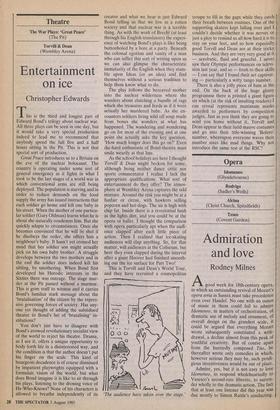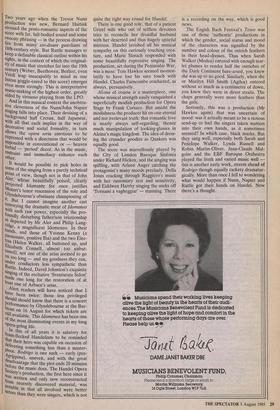Opera
Idomeneo (Glyndebourne) Rodrigo (Sadler's Wells) Alcina (Christ Church, Spitalfields) Teseo (Covent Garden)
Admiration and love
Rodney Milnes
Agood week for 18th-century opera, in which an outstanding revival of Mozart's opera seria in Sussex must take precedence even over Handel. No one with an ounce of music in them could fail to admire ldomeneo; in matters of orchestration, of dramatic use of melody and ornament, of overall design on the grandest scale, it could be argued that everything Mozart wrote subsequently constituted a with- drawal, a decline almost from this peak of youthful creativity. But of course apart from the hurriedly composed Tito, he thereafter wrote only comedies in which, however serious they may be, such prodi- gious inventiveness would be out of place.
Admire, yes, but it is not easy to love Idomeneo, to respond wholeheartedly to Varesco's second-rate libretto, to surren- der wholly to the dramatic action. The fact that at least one listener did this year was due mostly to Simon Rattle's conducting. Two years ago when the Trevor Nunn production was new, Bernard Haitink stressed the proto-romantic aspects of the score with fat, full-bodied sound and some swoony phrasing — in the process drawing fire from many soi-disant guardians of 18th-century style. But Rattle manages to keep a definable classical outline within his Sights, in the context of which the original- ity of music that stretches far into the 19th century (Weber, Beethoven, Berlioz, even Verdi leap inescapably to mind as one listens goggle-eared to this score) emerges even more strongly. This is interpretative nMsic-making of the highest order, greatly aided by virtuoso playing from the LPO. And in this musical context the unobtru- sive cleverness of the Nunn/John Napier staging falls into place. Their devising of a background half Cretan, half Japanese, With all that each implies in the way of decorative and social formality, in turn allows the opera seria emotions to be expressed with a directness that would be impossible in conventional or — heaven forbid — 'period' decor. As in the music, restraint and immediacy enhance each Other.
It would be possible to pick holes in some of the singing from a purely technical Point of view, though not in that of John Aler, whose beautifully poised, clearly Projected Idamante for once justifies Mozart's tenor rescension of the role and Glyndebourne's obstinate championing of t. But I cannot imagine another cast conveying the dramatic meat of ldomeneo with such raw power, especially the pro- foundly disturbing father/son relationship depicted by Mr Aler and Philip Lang- ridge, a magnificent Idomeneo. In their hands, and those of Yvonne Kenny (a Passionate, positive Ilia) and the two Elec- Lras. (Helen Walker, all buttoned up, and thzabeth Connell, almost too unbut- toned), ), not one of the arias seemed to go on too long — and my goodness they can, under conductors less sympathetic than Rattle. Indeed, David Johnston's exquisite singing of the recitative `Sventurata Sidon' ade one long for the restoration of at least one of Arbace's arias. Alert readers will have noticed that I have been twice: those less privileged should should know that there is a concert rrformance by Glyndebounie at the Bar- lean on 16 August for which tickets are still available. This Idomeneo has been one of the most illuminating events in my long opera-going life. , In this of all years it is salutory for loam-flecked Handefians to be reminded that their hero was capable on occasion of delivering something less than a master- piece. Rodrigo is one such — early (pre- 11.grippina), uneven, and with the great disadvantage that the plot ends 20 minutes t2efore the music does. The Handel Opera Nociety's production, the first here since it W,_as written and only now reconstructed 'font recently discovered material, was notable in that all involved were better actors than they were singers, which is not quite the right way round for Handel. There is one good role, that of a patient Grizel wife who out of selfless devotion tries to reconcile her dreadful husband with her deserted and thus hugely spiteful mistress. Handel lavished all his musical sympathy on this curiously touching crea- ture, and Marie Slorach responded with some beautifully expressive singing. The production, set during the Peninsular War, was a mess: Tom Hawkes seemed momen- tarily to have lost his sure touch with Handel. Charles Farncombe conducted, as always, persuasively. Alcina of course is a masterpiece, one whose musical strength easily vanquished a superficially modish production for Opera Stage by Frank Corsaro. But amidst the modishness the producer hit on one eternal and not irrelevant truth: that romantic love is nearly always self-regarding, thence much manipulation of looking-glasses in Alcina's magic kingdom. The idea of dress- ing the crusader goodies as Quakers was equally good. The score was marvellously played by the City of London Baroque Sinfonia under Richard Hickox, and the singing was spiffing, with Arleen Auger catching the protagonist's many moods precisely, Della Jones cracking through Ruggiero's music with her customary zest and sensitivity, and Eiddwen Harrhy singing the socks off `Tornami a vagheggiar' — stunning. There is a recording on the way, which is good news.
The Engish Bach Festival's Teseo was one of those 'authentic' productions in which the gender, social status and mood of the characters was signalled by the number and colour of the ostrich feathers in their head-dresses. Thus when Sarah Walker (Medea) entered with enough scar- let plumes to render half the ostriches of the Dark Continent bare-arsed, you knew she was up to no good. Similarly, when she or Marilyn Hill Smith (Agilea) entered without so much as a centimetre of down, you knew they were in direst straits. The chaps generally wore more feathers than the girls.
Seriously, this was a production (Mr Hawkes again) that was uncertain of mood: was it actually meant to be a riotous send-up or had the singers taken matters into their own hands, as it sometimes seemed? In which case, black marks. But they sang well, especially both Sarah and Penelope Walker, Lynda Russell and Robin Martin-Oliver. Jean-Claude Mal- goire and the EBF Baroque Orchestra played the fresh and varied music well — this is another early work, streets ahead of Rodrigo though equally rackety dramatur- gically. More than once I fell to wondering what would happen if Nunn, Napier and Rattle got their hands on Handel. Now there's a thought.











































 Previous page
Previous page